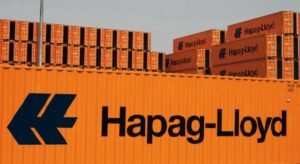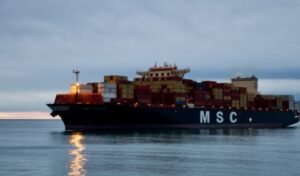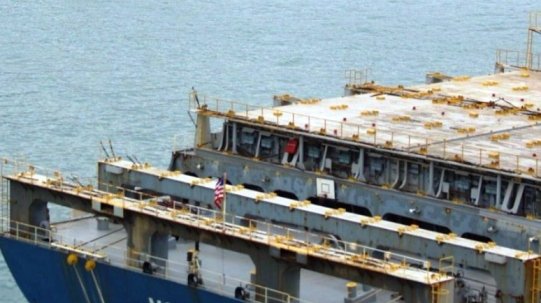On Friday, two Liberian-flagged (west Africa) ships were attacked in the Bab al-Mandab Strait (Red Sea) by forces from Yemen controlled by the Houthi group, according to a U.S. defense official. This incident highlights the growing threat to vessels in shipping lanes targeted by the Iran-aligned group.
The German-owned vessel, Al Jasrah, was hit by what is believed to be a drone, resulting in a fire but no injuries. In a separate attack, two ballistic missiles were launched, one of which hit a ship and started a fire that the crew was trying to put out. A U.S. Navy destroyer is en route to assist the affected ship, whose name has not been disclosed.

Attack was associated with the Israel-Hamas conflict
The Houthis, who are aligned with Iran and control much of Yemen, have been attacking vessels in the Red Sea and launching drones and missiles at Israel since the beginning of the Israel-Hamas conflict in Gaza. They claim their actions are in support of the Palestinians.

The Hapag-Lloyd, company confirms the attack on their Ship
Hapag-Lloyd, the company that owns Al Jasrah, confirmed that their ship was attacked near the Yemeni coast of the Red Sea. The company has pledged to take additional measures to ensure the safety of its crews.
On the same day, two other shipping incidents were reported. The Liberia-flagged container ship, MSC ALANYA, was ordered by individuals believed to be part of the Houthi movement to change its course towards Yemen, forcing it to take evasive action. However, a spokesperson for MSC denied any attack on the vessel.
In another incident, the Liberia-flagged, Swiss-owned containership MSC PALATIUM III was targeted while sailing northbound approximately 23 miles southwest of Mokha. The vessel, which was en route to Saudi Arabia, received the same warning as the ALANYA. The party responsible for this incident has not been identified.

Houthis warning
The Houthis have vowed to continue their attacks until Israel ceases its offensive in the Gaza Strip. They claimed to have hit a Maersk container vessel with a drone on Thursday, but the Danish shipping company denied the vessel was hit.
Work on resolving the issues

Diplomatic efforts are in full swing to resolve the Yemen conflict. The U.S., led by President Biden, has appointed Tim Lenderking as a special envoy to Yemen and halted support for offensive operations. The U.N.’s special envoy for Yemen, Martin Griffiths, is also actively advocating for a cease-fire.
U.S. says, “Attacks will not be tolerated”
The U.S. expressed Washington’s desire for a wide-ranging maritime coalition to protect ships in the Red Sea and send a clear message to the Houthis that their attacks will not be tolerated. However, Iran’s Defence Minister Mohammad Reza Ashtiani warned that such a multinational naval force would encounter “extraordinary problems” in a region where Iran claims dominance.
Need to end the civil war

Saudi Arabia and the Houthi rebels have rekindled talks to bolster the informal cease-fire and plot a course to end the civil war. Yemen’s representative has expressed support for these peace initiatives.
However, the situation remains fraught. The Houthis have reportedly refused to meet with the envoys, and calls for a nationwide ceasefire, the reopening of Sana’a airport, and unhindered access to essential commodities continue. Despite these hurdles, the quest for peace persists.
Impacts on Trade

Houthi attacks on Red Sea shipping have had a significant impact on the region, raising concerns about the transport of oil, grain, and consumer goods. In response, major shipping lines like Maersk and Hapag-Lloyd have halted Red Sea transits.
The attacks have also prompted some companies to reroute their ships from the Suez Canal and Bab al-Mandab chokepoint, opting for the longer route around the Cape of Good Hope. This increases transit times and disrupts global trade. The risk remains high as long as ships of various nationalities continue to be targeted. The shipping industry is on high alert due to the volatile situation












Comments 2